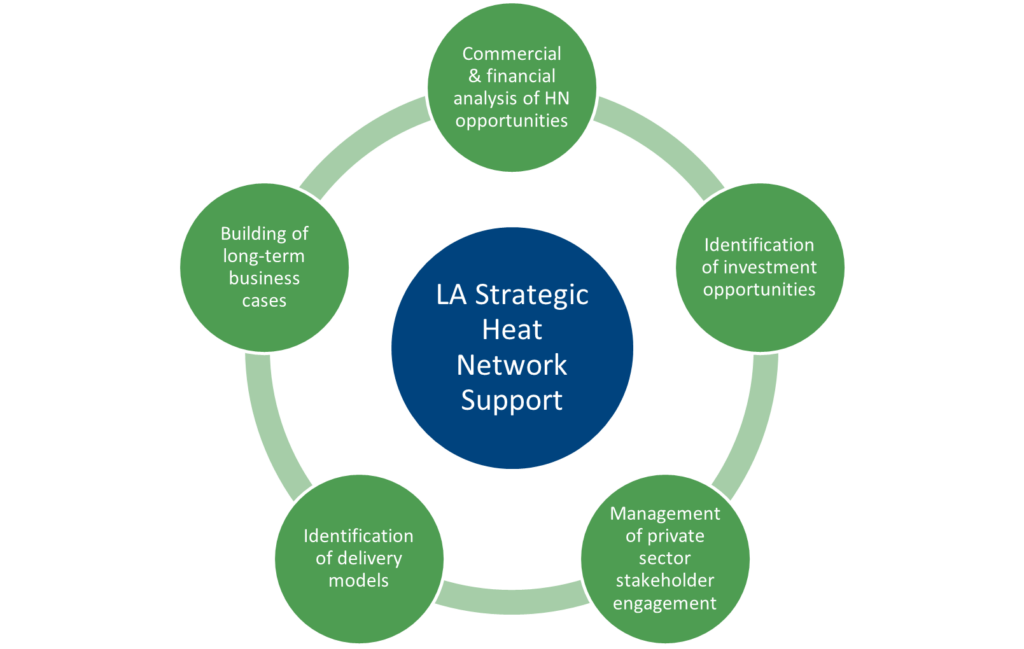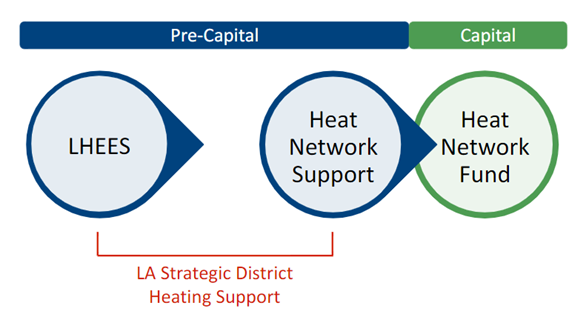The Heat Network Support Unit (HNSU) is providing additional support to build on existing Local Heat and Energy Efficiency Strategies (LHEES) work and support local authorities in developing a strategic approach to deploying large scale heat networks in their respective areas.
We appreciate that needs will vary greatly depending on the local authority and the local context. We propose that this funding can be used to support large scale heat network related activities identified by LHEES delivery plans or other activities which local authorities may not have yet identified but the HNSU deems crucial as part of building the business case for long-term large scale heat network deployment through a preferred delivery model.
The HNSU can cover up to 90% of the costs (capped at £150,000), requiring a 10% contribution from the Council. Applications that require spending over multiple financial years will be considered.

Local authority strategic heat network support consists of five elements:
- Commercial and financial analysis of heat network opportunities
- Identification of investment opportunities
- Management of private sector stakeholder engagement
- Identification of delivery models
- Building of long-term business cases
Eligibility Criteria
It is anticipated that eligible projects will demonstrate the following qualities:
- ability to demonstrate a contribution to delivery of ambitions to decarbonise Scotland’s heat demand at scale;
- ability to demonstrate compatibility with the relevant local authority’s draft or final Local Heat and Energy Efficiency Strategy (LHEES);
- if a draft LHEES is not available, ability to demonstrate the completion of Stage 4 of the LHEES methodology and a clear intention to pursue a large scale heat network
- the potential to inform decision-making that will have a positive and significant social and economic impact on Scotland;
- the potential to inform decision-making that will have a positive and significant impact on skills and supply chain in Scotland;
- ability to demonstrate additionality, i.e. the need for grant support from the Heat Network Support Unit, including clear evidence of any funding gap to develop the work within scope;
- ability to provide confirmation of sources of funding that will partially contribute towards the costs of this work;
- demonstrate clear plans for local and market engagement;
- demonstrate that the organisation seeks to build internal capacity to support the future delivery of heat networks
- ability to demonstrate organisational commitment at CEO level; and
- ability to demonstrate organisational commitment to the Fair Work First criteria
Through this activity, local authorities are expected to build the business case (or parts of a business case) that provides clear basis for decision-making on long term heat network delivery and sets the timeframe to do so. Subsequently, outputs can also be used to inform LHEES Delivery plans, or through new tools, for example investment prospect, investment plan etc. Successful applicants may also find that this support bridges the gap between their LHEES and application to the HNSU for pre-capital funding. The various support available through the HNSU can facilitate a pipeline through which projects may eventually be prepared to make an application to Scotland’s Heat Network Fund.
